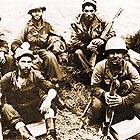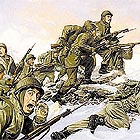|
 |
|
Esta página no está disponible en español. El SentinelPuerto Rico's InfantryBy Walter PachecoJanuary 26, 2002
QUOTE: 'There is a real urgency to capture the history of these veterans.' Maggie Rivas-Rodríguez
Memories. ---------- (PHOTOS: U.S. Army; WALTER PACHECO/EL SENTINEL) Carlos Ruíz Gaudín's memory of 1951 Korea is as clear as when he was a 19-year-old with a carbine hiding in trenches to avoid Chinese enemy fire. "After being in combat for several months, you forget about dying," said Gaudín from his immaculate home in south Orlando. Although no blotchy sepia-toned photographs of his military career as a Company B rifleman for the all-Puerto Rican 65th Infantry Regiment adorn his walls, he possesses a microscopic memory of his experiences and delights in telling of his experiences. Gaudín's memories and those of fellow soldiers of the 65th Infantry, now in their late 70s or 80s, would be lost were it not for the interest of Latino scholars in recording the history of this fighting battalion. "There is a real urgency to capture the history of these veterans," said Maggie Rivas-Rodríguez, assistant professor at the University of Texas who has been conducting a two-year project into Latino veterans, their accomplishments and stories. New York producer Noemi Figueroa Soulet this week interviewed Gaudín, among others in Orlando, for her documentary on the Latino troop. For Gaudín, his stories are of bravery and survival. "It was a shock for me when I first stepped in Korea," he said. Korea's dynamic weather conditions, comprising stagnant summers and minus 40-degree winters, killed many soldiers accustomed to San Juan's balmy breezes. "We were totally unfamiliar with that kind of territory, and it took some getting use to while still trying to survive gunfire. Sometimes we had no water to bathe or food to eat, not to mention the diseases we were also battling." An episode of frostbite nearly killed Gaudín while he kept his post. "I had to watch over my post alone because my partner was injured and his foot was swollen and getting worse. Although he begged me to kill him, I could not," Guadín said. "While comforting him to keep him quiet because the enemy might hear us, I lost my glove and returned to my post. After a few hours, I could no longer feel my hand, arms, and later, my entire body. All I could move were my eyes." Gaudín spent two weeks in a hospital, unable to move or speak.
---------- Wars Past. ---------- "I just remember seeing the doctors marking my chest and legs. All I could think was that they were going to amputate my legs -- I thanked God I was still alive." Gaudín remembers one of the worst battles was at the Yalu River, which divides North Korea from China. "I hit the ground as we were struck by a wave of gunfire," Gaudín said. "I was afraid to raise my head for fear of being speared with a bayonet so I just opened my eyes, and all I saw were clouds." He interrupted his narrative and recalled a story his mother once told him. "If you're good, you go to heaven when you die," he said. "If you're bad, well, then you don't." "I thought I was dead and this was heaven. Soon the clouds cleared and I realized it was just fog. I got up and ran through the river to the other side to meet the other Army troops." Unfortunately, the Army has no record of that battle, and many others, but Gaudín remembers and for him that's all he needs. "There were many men in my company, about 253 and they were family -- we were brothers," he said. Although a few veterans remain in the Orlando area, Gaudín said he has lost touch with many. "I now have diabetes and cirrhosis of the liver. It's tough," he said. "But I'm still here and I still have my memories."
|

 ----------
----------